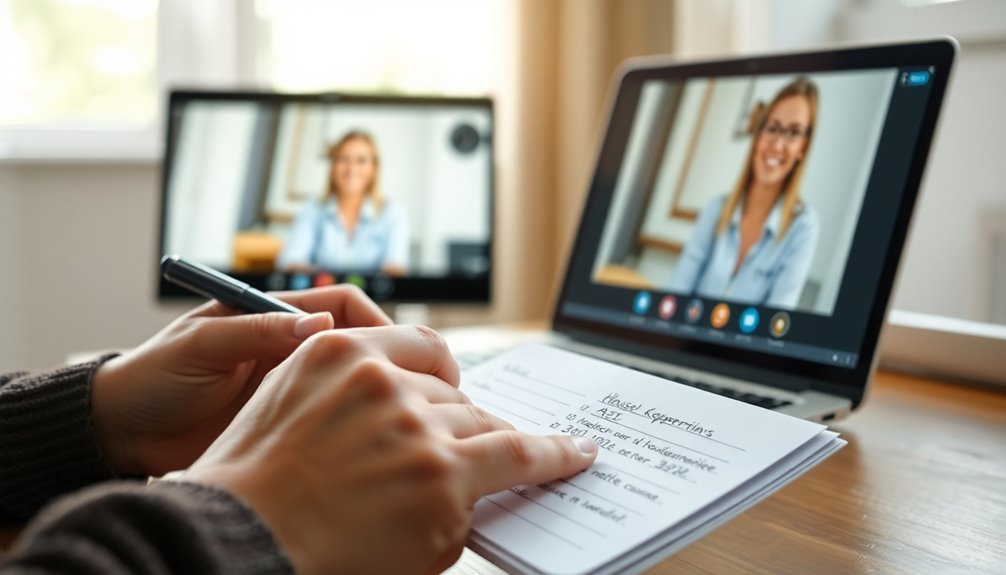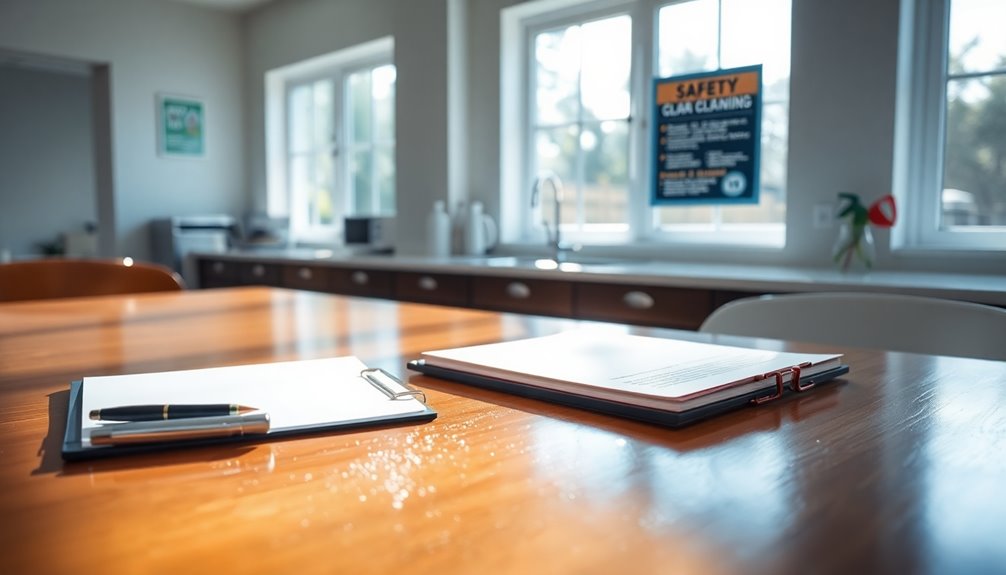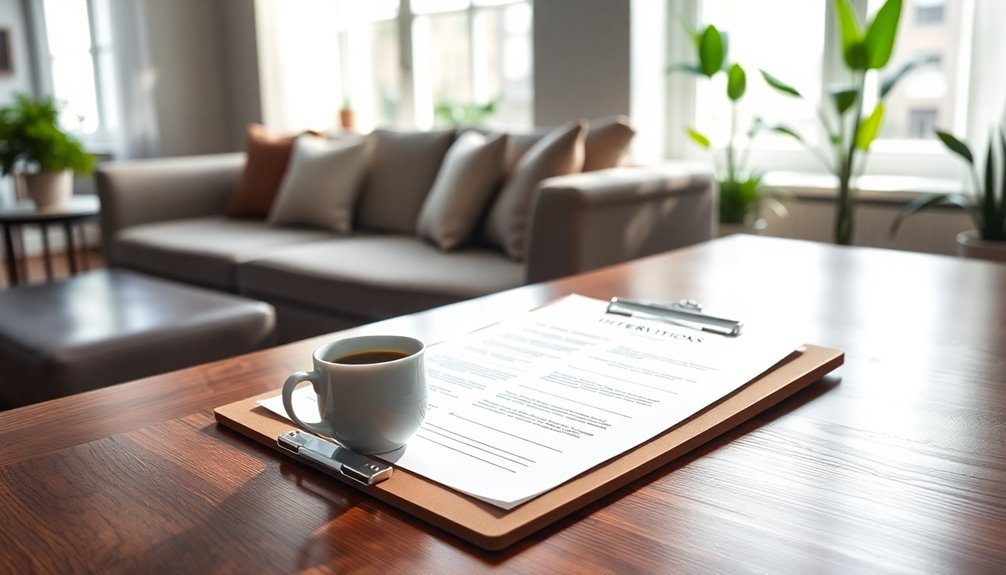Revealing the secrets to housekeeper interviews starts with understanding essential questions and your personal journey in housekeeping. Prepare a simple three-word self-description that captures your essence. Discuss what motivates you and pinpoint your favorite and least favorite tasks—this shows your work ethic. Familiarize yourself with different housekeeping roles, as each requires unique skills. Communication is key, so practice clarity and active listening. Maintain a positive attitude, set achievable goals, and know safety regulations. These insights can set you apart as a candidate. Stick around, and you'll discover more strategies to shine in your interviews.
Key Takeaways
- Prepare a compelling personal journey story to illustrate your passion for housekeeping during the interview.
- Develop a three-word self-description that encapsulates your personality and aligns with the housekeeping role.
- Highlight your motivation for pursuing a career in housekeeping, focusing on your desire to create clean and welcoming environments.
- Be ready to discuss your favorite and least favorite tasks, showcasing your work ethic and ability to handle all aspects of the job.
- Demonstrate knowledge of safety protocols and cleaning regulations, emphasizing your commitment to a safe and efficient work environment.
Essential Interview Questions

When preparing for a housekeeping interview, it's crucial to anticipate essential questions that employers are likely to ask. You might start with an introduction and share a brief self-description, highlighting your journey into housekeeping.
Be ready to discuss your interests outside work, especially if they relate to the role. Employers often ask for a three-word self-description to gauge your personality.
Expect questions about your motivation for pursuing a housekeeping career, focusing on what drives you to excel in this field. Additionally, think about your favorite and least favorite tasks, as they can provide valuable insights into your work ethic and preferences.
Preparing thoughtful responses to these questions will help you stand out as a candidate.
Understanding Housekeeping Roles

Understanding the various roles within housekeeping is essential for anyone entering the field. Housekeeping isn't just about cleaning; it encompasses a range of responsibilities tailored to different environments.
You might find yourself working as a room attendant in hotels, a janitor in schools, or a private housekeeper in residences. Each role requires specific skills and approaches. For example, hotel housekeepers focus on efficiency and attention to detail, while private housekeepers often manage household schedules and laundry.
Knowing these distinctions helps you determine where your strengths lie and what environment suits you best. By understanding these roles, you can align your skills with the demands of the job, enhancing your chances of success in the housekeeping field.
Effective Communication Skills

Effective communication skills are essential in housekeeping, as they directly impact both client satisfaction and teamwork. When you're clear and concise, you build trust with clients and foster collaboration with colleagues. Active listening is key; it guarantees you understand client needs and expectations.
Here's a quick overview of effective communication elements:
| Element | Importance |
|---|---|
| Clarity | Prevents misunderstandings |
| Active Listening | Builds rapport and understanding |
| Feedback | Encourages improvement and trust |
Maintaining a Positive Attitude

A housekeeper's positive attitude can make a significant difference in the quality of service provided and overall job satisfaction. When you approach your tasks with enthusiasm, it not only enhances your performance but also uplifts the mood of those around you.
To maintain that positivity, focus on techniques like setting small, achievable goals throughout the day. Celebrate your accomplishments, no matter how minor, and take breaks to recharge. Surrounding yourself with supportive colleagues can also help foster a positive environment.
Safety and Cleaning Regulations

How can you assure a safe and compliant cleaning environment? Start by familiarizing yourself with OSHA regulations that govern workplace safety.
Make sure you know the proper use of cleaning chemicals and personal protective equipment (PPE). Maintain a clutter-free area to prevent accidents and assure all cleaning tools are in good condition.
During interviews, discuss your experience with safety protocols and how you prioritize a secure workspace. Highlight your ability to handle hazardous materials responsibly and your understanding of emergency procedures.
Being knowledgeable about safety regulations not only protects you but also demonstrates professionalism to potential employers.
With a strong focus on safety, you'll create a trustworthy impression and foster a compliant cleaning environment.
Organizational Skills for Housekeepers

In today's fast-paced cleaning environments, staying organized is essential for housekeepers to manage their tasks efficiently.
Strong organizational skills not only enhance productivity but also guarantee a streamlined cleaning process.
Here are a few strategies to help you stay organized:
- Prioritize Tasks: List out daily tasks, focusing on high-traffic areas or special requests.
- Use Checklists: Create checklists for different spaces to guarantee you don't miss any details.
- Organize Supplies: Keep cleaning supplies neatly stored and easily accessible to save time.
Teamwork in Housekeeping

Effective organization not only streamlines your cleaning tasks but also sets the stage for successful teamwork in housekeeping.
When you collaborate with your colleagues, communication becomes key. Establish clear roles and responsibilities for each team member, ensuring everyone knows their tasks. Regular check-ins can help address any challenges and foster a supportive environment.
You should also share best practices and techniques; this not only enhances efficiency but also builds camaraderie among staff. Remember, a positive attitude goes a long way in motivating your team. Additionally, incorporating mindfulness practices can help reduce stress and enhance focus among team members.
Celebrate small victories together, and don't shy away from offering assistance when needed. By embracing teamwork, you'll create a harmonious workplace that ultimately leads to better service and satisfied clients.
Professional Development Opportunities

Exploring professional development opportunities can greatly enhance your skills and career prospects in housekeeping. By actively seeking out training and workshops, you position yourself for advancement and expertise.
Here are some valuable opportunities to evaluate:
- Workshops and Seminars: Participate in events that focus on the latest cleaning techniques and safety regulations.
- Online Courses: Enroll in courses that cover specialized topics, such as eco-friendly cleaning or advanced organizational strategies.
- Networking Events: Connect with other professionals to share best practices and gain insights into the industry.
Investing in your growth not only boosts your confidence but also improves your service quality, making you a sought-after candidate in the housekeeping field.
Frequently Asked Questions
What Are the Common Misconceptions About Housekeeping Jobs?
When you think about housekeeping jobs, you might believe they're easy or just about cleaning. However, that's a misconception.
Housekeeping requires a variety of skills like organization, time management, and attention to detail. It's not just about tidying up; it involves understanding safety regulations and using proper techniques.
Additionally, many housekeepers deal with physically demanding tasks and interact with clients, showcasing the importance of customer service in this role.
How Do You Handle Difficult Clients in Housekeeping?
When you handle difficult clients in housekeeping, stay calm and listen actively to their concerns.
Acknowledge their feelings and guarantee them you'll address the issue.
Use clear communication to explain how you plan to resolve it, and follow up to ascertain satisfaction.
Keeping a positive attitude helps diffuse tension.
What Are the Physical Demands of a Housekeeper's Role?
Picture yourself as a dancer, moving gracefully through a bustling stage of rooms.
As a housekeeper, you're on your feet most of the day, bending, lifting, and scrubbing surfaces.
You'll navigate stairs, carry heavy loads, and reach high places to clean every nook and cranny.
It's a physically demanding role that requires stamina and strength, but the satisfaction of seeing a spotless space makes it all worthwhile.
How Can a Housekeeper Advance Their Career?
To advance your housekeeping career, focus on enhancing your skills and gaining certifications.
Seek opportunities for training in specialized areas, like eco-friendly cleaning or management techniques.
Networking with other professionals can open doors to new positions.
Show initiative by volunteering for leadership roles within your team.
Finally, always maintain a positive attitude and be open to feedback, as this illustrates your commitment to growth and professionalism in the industry.
What Soft Skills Are Essential for Success in Housekeeping?
Did you know that 80% of successful housekeepers attribute their achievements to strong soft skills?
To thrive in housekeeping, you need excellent communication, adaptability, and time management skills. Being detail-oriented and having a positive attitude is essential, especially during busy periods.
Building rapport with clients enhances satisfaction and trust. Emphasizing teamwork allows you to collaborate effectively with colleagues, making the work environment more productive and enjoyable for everyone involved.
Conclusion
To sum up, mastering your housekeeper interview hinges on a blend of preparation and self-awareness. Research shows that candidates who articulate their experiences and skills confidently are 60% more likely to impress employers. By embracing effective communication, showcasing a positive attitude, and understanding the intricacies of housekeeping roles, you position yourself as a standout candidate. Remember, interviews are not just about answering questions; they're an opportunity to demonstrate your value and secure the job you desire.
Eugene brings a fresh, dynamic voice to our platform as one of our talented Writers. Specializing in research-driven content, he explores the latest findings in psychology and personal growth, translating them into actionable insights for our readers. Eugene’s work is fueled by a curiosity about what makes us tick and a desire to help others unlock their potential.










